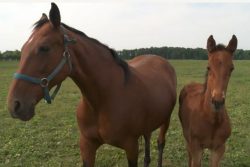Columbus, OH — Since the beginning of horse breeding, there have been an innumerable number of mutations and genetic advantages and disadvantages for the species. As both our knowledge and scientific advancements continue to evolve, there is hope to reveal the unknowns of genetics and continued success of the horse.

Horses have known genetic mutations. Some breeds even have their own specific gene mutations caused by breeding autosomal dominant or recessive gene mutations together without prior knowledge that the pair was affected. Some mutations can be beneficial to the horse such as creating a better performing athlete for competitions or races, surviving severe weather, or even down to a desirable coat color.
Unfortunately, some mutations can cause irreversible abnormalities that can inhibit a horse’s quality of life.
To counteract these abnormalities in future foals, the U.S. Trotting Association announced in Dec. 2020 that it has joined forces with the Veterinary Genetics Laboratory at the University of California, Davis to assist in a research study entitled, “Genetic Investigation of Traits of Economic Importance in Horses.”
“The study that we, along with the team at UC Davis are leading, is an attempt to further our knowledge of genetic abnormalities within our breed. This research can’t be done solely behind a desk in Westerville, Ohio, or in a lab in California. It takes all of our owners and breeders to assist us, by collecting the needed DNA samples of foals with such genetic mutations that could potentially, in turn, give breeders back the knowledge by carefully selecting away from the possible defects through the information,” said TC Lane, USTA chief operating officer and director of registry.
Since partnering with UC Davis, the USTA has developed a protocol for reporting genetic abnormalities that can be studied utilizing genomics to investigate the possibility of mutations currently happening or that may occur in the future. Since December 2020, DNA samples have been collected and sent to UC Davis for analyzing, but more samples are needed to help verify genetic mutation similarities.
Examples of abnormalities can be (but are not limited to): microphthalmia, wry nose, cleft palate, contracted, missing or additional limbs, hernias, deformed bodies, and many more.
To assist in the study, the USTA requests that breeders and owners submit DNA samples for testing of still born foals or those with apparent abnormalities at or after birth.
To participate in the study, a report and consent form, along with photos of the foal should be submitted to the USTA. To help researchers obtain quality information on individual foals, a necropsy is recommended but not required. If a necropsy is performed, results should also be sent in along with the report and consent forms. All blood and/or hair samples should be sent directly to UC Davis to preserve the quality of the sample. The USTA can provide blood tubes to those that request them.
To obtain or get further information on the forms, contact Gabby Fleming at gabby.fleming@ustrotting.com or by calling 877.800.8782, ext. 3231.
Blood samples are preferred; however, hair samples may also be submitted.
Samples with identification should be sent to:
Dr. Rebecca Bellone/Elizabeth Esdaile
Veterinary Genetics Laboratory
Old Davis Road
Davis, CA 95616-8744.
Participation in the study is voluntary and any participant has the right to withdraw from the study at any time. There is no financial obligation on the part of the participant.
Any data collected as part of participation in this study will remain confidential, but any of this data may be used for scientific purposes including publication of results without identifying a particular animal, owner, or breeder. The USTA will share any results from this study that are made public or published.
